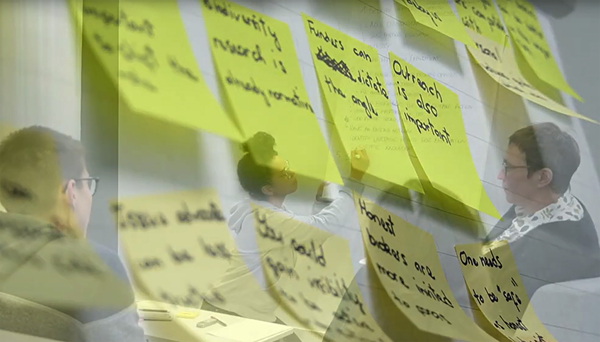News Detail
Translating science into action and engage in biodiversity policy-making
December 10, 2024 |
At the end of a research project, early-career scientists often face the questions: What now? How can my results find their way into practice? How can I contribute my knowledge to the political debate? To support researchers in addressing the challenges of biodiversity conservation, the Blue-Green Biodiversity Research Initiative of Eawag and WSL and the University of Zurich organised a two-day workshop in November called “Capacity Building Workshop on Effective Science-Policy Collaboration in Biodiversity Management”.
Video from the workshop “Translating science into action and engage in biodiversity policy-making”
Networking with stakeholders right from the start
The workshop provided junior researchers with practical approaches for effective collaboration between science and politics. The aim was to give them tools that they can use to actively shape biodiversity policy in Switzerland and globally. “For example, it is crucial to establish close contacts with relevant stakeholders right at the beginning of a research project and to build a basis of trust between science, practice and political decision-makers,” says Dechen Lham, postdoctoral researcher at Eawag and WSL and coordinator of the workshop. This also includes finding a common language to bridge the gap between research and practice. This is the only way to jointly develop viable solutions and initiate relevant political changes.
“We developed a program which included how researchers can engage in biodiversity policy at all levels. Often engaging at the science-policy interface seems overwhelming to researchers if the only option seems to be at the global scale” says Debra Zuppinger-Dingley, from the University Research Priority program on Global Change and Biodiversity of the University Zurich and co-organiser of the workshop.
Stepping into the role of political decision-makers
A highlight of the workshop was the roleplay of a political decision-making body. The participants took on the roles of political decision-makers at various levels – global, national, cantonal and communal – and discussed various issues relating to cooperation between science and politics. “In light of the current discussions on biodiversity, it is important that young researchers become active not only in science, but also in the political shaping of biodiversity and effectively contribute their research results to political processes,” says Dechen Lham.
At the workshop, experts from boundary organisations, which build bridges between science and politics, also reported on their many years of experience in this professional field. Two qualities, for example, are key to working at this interface: perseverance and patience. The participants also had the opportunity to develop their own policy action plan for their research findings and discuss it with the experts.
Financing
The Workshop was jointly funded by
- the Blue-Green Biodiversity research initiative of the aquatic research institute Eawag and the Federal Institute for Forest, Snow and Landscape Research WSL
- the University Research Priority Programme in Global Change and Biodiversity at the University of Zurich and
- the PhD Program in Ecology at the University of Zurich and ETH Zürich jointly funded the workshop.
Cover picture: Screenshoot des Videos “Translating science into action and engage in biodiversity policy-making”, Eawag.

